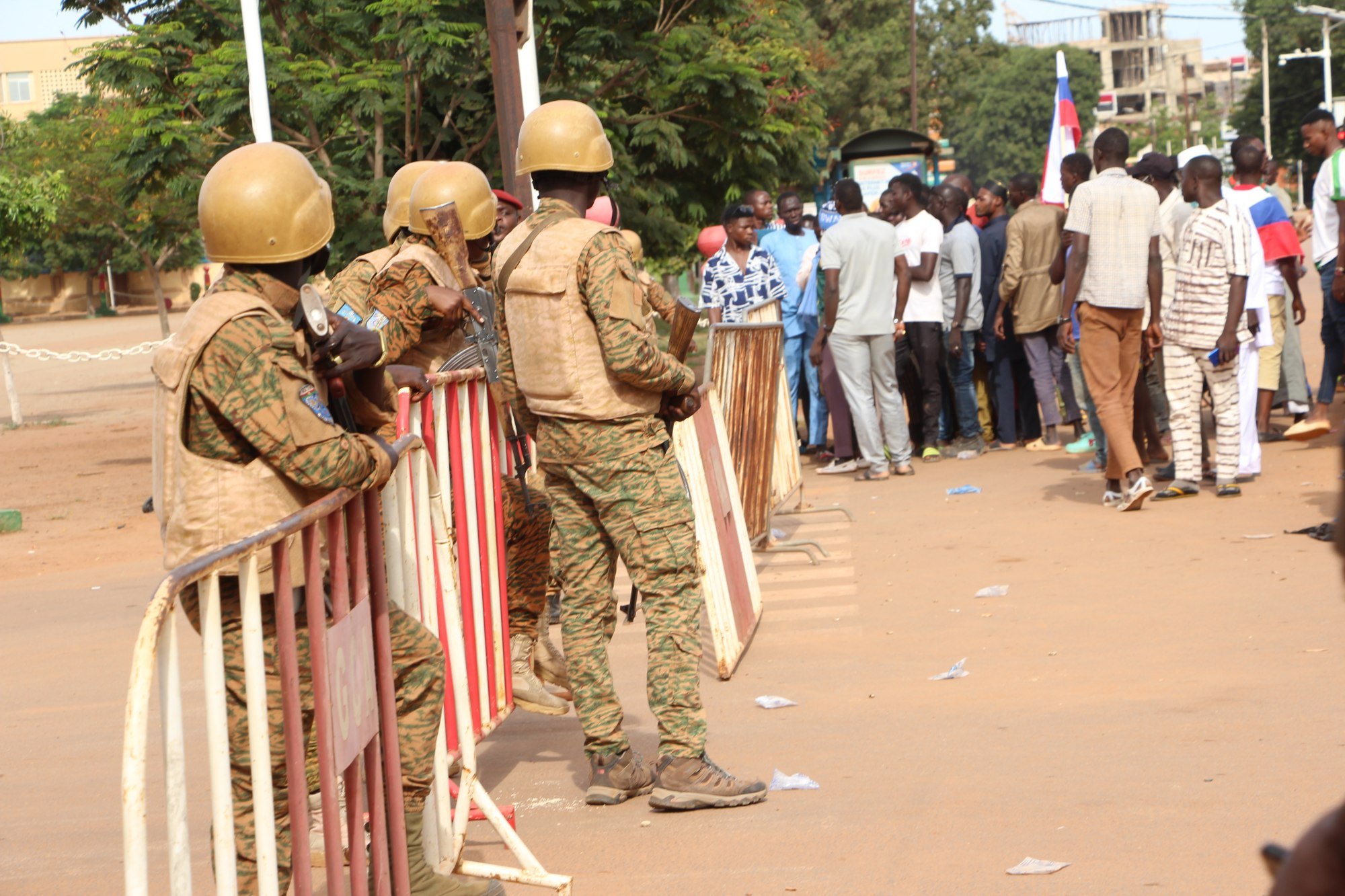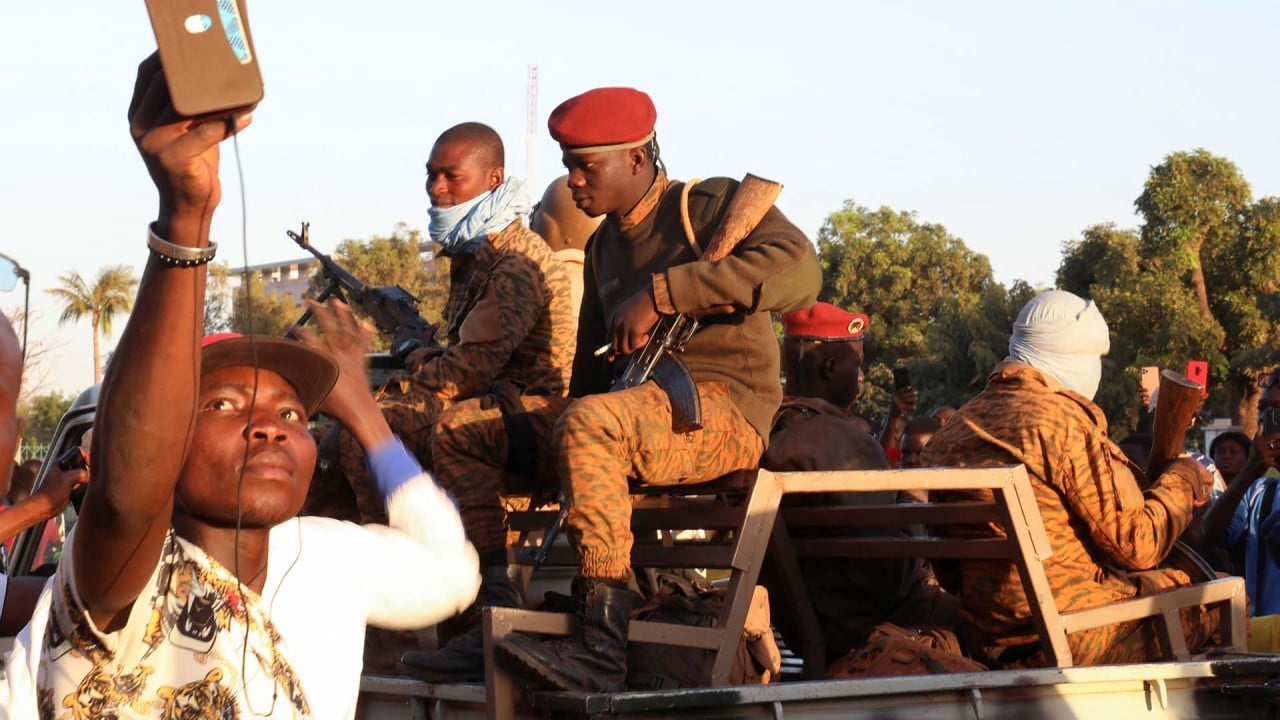
Burkina Faso army officers remove junta leader in new coup
- More than a dozen members of the military seized control of state television to declare that President Paul Henri Sandaogo Damiba had been overthrown
- Captain Ibrahim Traore was named the new head of the volatile West African country, only nine months after the previous leader was ousted
More than a dozen members of Burkina Faso’s army seized control of state television late Friday, declaring that the country’s coup leader-turned-president, Lieutenant-Colonel Paul Henri Sandaogo Damiba, had been overthrown.
The spokesman introduced Captain Ibrahim Traore as the new head of the volatile West African country that is battling a mounting Islamic insurgency.
Damiba and his allies overthrew the democratically elected president only nine months ago, coming to power with promises of make the country more secure.
However, violence has continued unabated and frustration with his leadership has grown in recent months.
“In the face of the continuing deterioration of the security situation, we have repeatedly tried to refocus the transition on security issues,” said the statement read aloud on Friday evening by the soldiers.
The soldiers promised the international community they would respect their commitments and urged Burkinabes “to go about their business in peace”.
Burkina Faso’s latest military power grab follows in the footsteps of neighbouring Mali, which also saw a second coup nine months after the August 2020 overthrow of its president.
Damiba had just returned from addressing the UN General Assembly in New York as Burkina Faso’s head of state. Tensions, though, had been mounting for months.
China’s ambassador to Burkina Faso works to make up ground on projects
Constantin Gouvy, Burkina Faso researcher at Clingendael, said Friday night’s events “follow escalating tensions within the ruling MPSR junta and the wider army about strategic and operational decisions to tackle spiralling insecurity”.
“Members of the MPSR increasingly felt Damiba was isolating himself and casting aside those who helped him seize power,” Gouvy said.
Gunfire had erupted in the capital, Ouagadougou, early on Friday and hours passed without any public appearance by Damiba. Late in the afternoon, his spokesman posted a statement on the presidency’s Facebook page saying that “negotiations are under way to bring back calm and serenity”.
Friday’s developments felt all too familiar in West Africa, where a coup in Mali in August 2020 set off a series of military power grabs in the region. Mali also saw a second coup nine months after the August 2020 overthrow of its president, when the junta’s leader sidelined his civilian transition counterparts and put himself alone in charge.

On the streets of Ouagadougou, some people already were showing support Friday for the change in leadership even before the putschists took to the state airwaves.
Francois Beogo, a political activist from the Movement for the Refounding of Burkina Faso, said Damiba “has showed his limits”. “People were expecting a real change,” he said of the January coup.
Some demonstrators voiced support for Russian involvement to stem the violence, and shouted slogans against France, Burkina Faso’s former coloniser. In Mali, the junta invited Russian mercenaries from the Wagner Group to help secure the country, though their deployment has drawn international criticism.
Many in Burkina Faso initially supported the military takeover last January, frustrated with the previous government’s inability to stem Islamic extremist violence that has killed thousands and displaced at least 2 million.
Russian mercenaries spearhead the battle for Libya’s capital
Yet the violence has failed to wane in the months since Damiba took over. Earlier this month, he also took on the position of defence minister after dismissing a brigadier general from the post.
“It’s hard for the Burkinabe junta to claim that it has delivered on its promise of improving the security situation, which was its pretext for the January coup,” said Eric Humphery-Smith, senior Africa analyst at the risk intelligence company Verisk Maplecroft.
Earlier this week, at least 11 soldiers were killed and 50 civilians went missing after a supply convoy was attacked by gunmen in Gaskinde commune in Soum province in the Sahel.
That attack was “a low point” for Damiba’s government and “likely played a role in inspiring what we’ve seen so far today”, added Humphery-Smith.

UN spokesman Stephane Dujarric said on Friday that nearly one-fifth of Burkina Faso’s population “urgently needs humanitarian aid”.
“Burkina Faso needs peace, it needs stability, and it needs unity in order to fight terrorist groups and criminal networks operating in parts of the country,” Dujarric said.
Chrysogone Zougmore, president of the Burkina Faso Movement for Human Rights, called Friday’s developments “very regrettable”, saying the instability would not help in the fight against the Islamic extremist violence.
“How can we hope to unite people and the army if the latter is characterised by such serious divisions?” Zougmore said. “It is time for these reactionary and political military factions to stop leading Burkina Faso adrift.”


